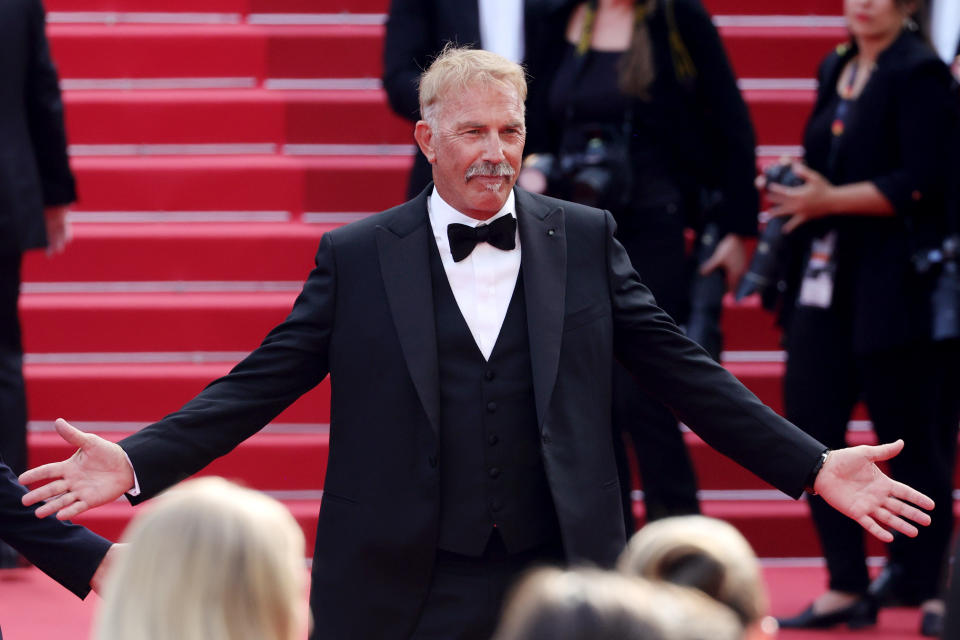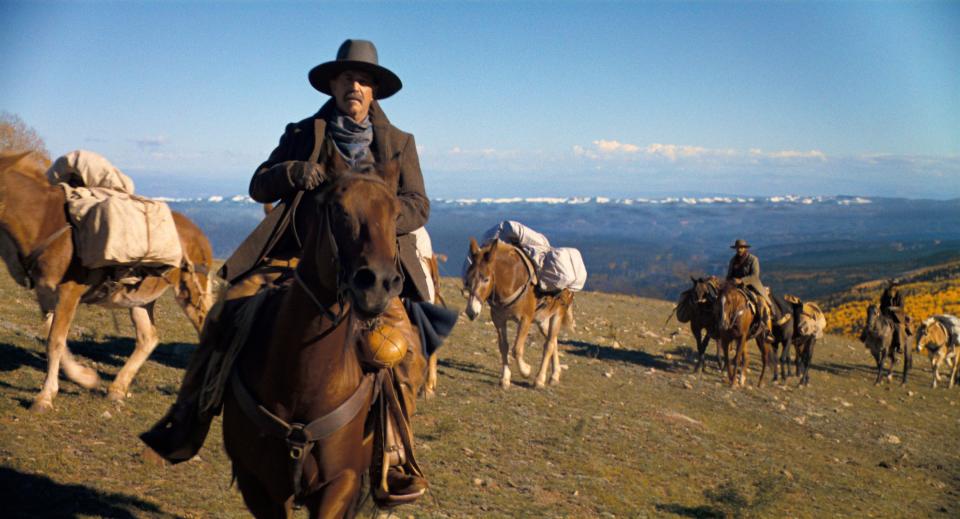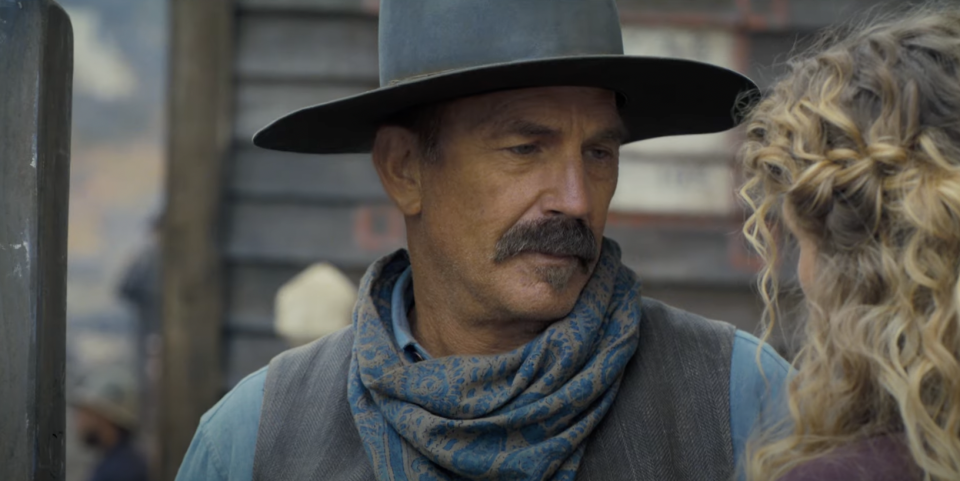Kevin Costner’s ‘Horizon’ May Cost Him Everything, but ‘I Don’t Want to Have to Answer to Anybody’

- Oops!Something went wrong.Please try again later.
- Oops!Something went wrong.Please try again later.
Kevin Costner feels Francis Ford Coppola’s pain. Both invested their own millions — “just shy of $100 million” for Costner, he told me, and $120 million for Coppola — in ambitious movies that no one else wanted to fund.
“Horizon: An American Saga — Chapter 1” (which debuted out-of-competition at Cannes on May 19 to the extended standing ovation that is de rigueur these days) landed New Line/Warner Bros. as its stateside theatrical distributor in what Costner said was a “very modest” deal. He added that “Horizon” sold well to foreign territories at Cannes via K5, although it was slow going at first.
More from IndieWire
Coppola is still hoping someone will pay him to release his film. Costner is concerned that the auteur is vulnerable. “There’s people that will take advantage of you and I fear people will do that to Francis,” he said. “I’m worried about him, too. I feel they will do that to him. This is a gentle man who’s given us so much to think about and enjoy.”
Warners made an independent pickup for the two “Horizon” chapters Costner has completed thus far. Many who have seen “Horizon” (including our own critic) think that the three-hour “Chapter 1” is a gorgeous production, but it’s structured as a TV series. (Its 51 Metascore is here.) But Costner insisted on a theatrical release.
“That’s where I belong,” he said. “And I also felt that I have to look at things from a monetary standpoint, because I have so much invested, that I didn’t want to throw that window away. But artistically, I thought it should be on the big screen.”
In Cannes, Costner told me he invested $100 million of his own money; that’s the budget for the first two movies. He’s told others he spent $20 million, deferred his fees (a reported $12 million per film), brought in investors, and mortgaged his Santa Barbara home. At any rate, he bristled when I suggested that he spent less of his own money than Coppola did.
“If I make the fourth one, it will be over [Coppola’s $120 million],” he said. “People don’t know what the reality is. ‘Oh, you know what, I’m happier that these two have been made.’ And then I know by hook or by crook, I’m going to make three. And by hook or by crook, I’m going to make four. The truth isn’t really that important to a lot of people.”
“Horizon” began as one movie in 1988. He tried to elicit interest and funding for a version of the story that launches the movie, originally a “Butch and Sundance” brotherly two-hander. He almost got it made at Disney after his “Open Range” in 2003, but they wrangled over a $5 million difference in budgetary opinion. (“I’m not going to work for free,” he said.)
Costner kept writing with collaborator Jon Baird, and over the years, the script grew into four stories. One stars Costner as a white knight straight-shooter who rescues a flirtatious frontier woman (Abbie Lee). He said he’s considering adding more of her character in the second film, which is due in theaters August 16.

“[In] all the movies we’ve all watched in Westerns, we always come to a town that’s already there,” Costner said. “But there must have been a real trauma at first because there were people there before that didn’t want to give up the good spots. The first indigenous people lived there for 15,000 years, they knew where the good well water was, where it was easy to cross the river. So there had to be conflict over how these towns even emerged.”
That was the idea Costner pursued. “Which was insane,” he said. “Because the reality was nobody wanted to make the first one. So what made me think they would want to see four more? And I have to admit, I understand the logic of that. I said, ‘Well, we have to make four because the story’s not over till the fourth one.’ I started filming the third one, shot three days. And now I have to figure out where I can get more money to finish it.” Costner left the shoot to come to Cannes.
Costner includes some classic Western female stereotypes in the film, from a widow seeking a man’s protection (Sienna Miller) to an enterprising prostitute (Lee). “Women’s place in the West was very important to me,” he said. “They were drug out there against their will. And most of them all died working themselves to death, if they weren’t killed. They died giving childbirth. They died keeping their children clean and feeding them and washing clothes. It was a 24-hour situation for them. It never changed for about 200 years out there.”

“Sienna Miller needed to find a man immediately,” he said. “In the West, she didn’t care about what people thought about her reputation. And that was real out on the West. You couldn’t make it alone.”
The movie is crammed with delicious character actors of a certain age, including a craggy Michael Rooker as a hard-drinking soldier at a cavalry outpost right out of John Ford Western. “That was my ode to John,” said Costner, who accepts the description “old-fashioned” as a compliment.
Costner didn’t stint on the details and drove his crew crazy seeking remote locations and ignoring the schedule if something wasn’t right. He collaborates and listens, he said, but everyone knows who’s boss: “Just do the job.” As for his horseriding abilities, he’s modest. “I am not a cowboy,” he said.
The best thing in the movie is a beautifully directed 45-minute sequence showing a ruthless attack by a local tribe on a new town of settlers. “Everybody’s saying, ‘You can’t do that,'” Costner said. “And I said, ‘Well, that’s how it was written. And I’m going to do it.’ There’s a heroism to people who tried to settle out here and make it right with their families only to be destroyed in an act of violence. And those people had every right to attack them. At a certain point, they wouldn’t leave this river that they’d crossed for hundreds of years.”

In Chapter 1 at least, Costner goes a tad light on the story about the indigenous tribes in the area; he said there’s more to come in the fourth movie. He also took his share of criticism for 1990 revisionist Western and box-office smash “Dances with Wolves,” which took home Oscars for Best Picture and Director.
How did the “American Saga” keep getting longer and longer? “For me, as a feature, I didn’t want people to wait two or three years for a sequel that I was inventing. And so I just want to keep making them. Regardless of ‘Well, let’s watch the economics and see how we do.’ That’s prudent, but not to me.”
Will audiences show up to see these movies? “We’re out on a limb,” Costner said.
When Costner paired with Coppola in a recent interview, he was thrilled: “He and I were looking at each other. And we both understood that our choices weren’t defined by things we already own. We can’t let the fear of losing these stop the ticking of our heart. That whispers the loudest to us. I can’t explain it exactly. I don’t think this movie is more important than any other movie I made. But it was somehow important for me to make it. I had never fallen out of love with it. … And I don’t want to have to answer to anybody.”
Best of IndieWire
The Best LGBTQ Movies and TV Shows Streaming on Netflix Right Now
Guillermo del Toro's Favorite Movies: 54 Films the Director Wants You to See
Nicolas Winding Refn's Favorite Films: 37 Movies the Director Wants You to See
Sign up for Indiewire's Newsletter. For the latest news, follow us on Facebook, Twitter, and Instagram.

